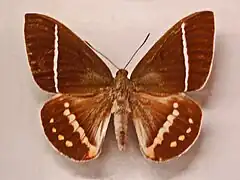| Amauta cacica | |
|---|---|
 | |
| Scientific classification | |
| Kingdom: | |
| Phylum: | |
| Class: | |
| Order: | |
| Family: | |
| Genus: | |
| Species: | A. cacica |
| Binomial name | |
| Amauta cacica (Herrich-Schäffer, [1854])[1] | |
| Synonyms | |
| |
Amauta cacica, the sugar-cane borer moth, is a moth in the Castniidae family. It is found in Colombia, Ecuador, Guatemala, Costa Rica and Panama.
The larvae feed on plantains and can cause moderate damage. Other recorded food plants include Heliconia griggsiana. They bore the roots of their host plant. From the initial penetration, larvae tunnel into the corm of the plantain and feed there until close to maturity. The mature larva tunnels upwards in the plantain stalk to an average height of one meter, where it makes an exit hole. The larva retreats back down the tunnel about 30 cm, where it pupates inside a case made of fibers from its host plant.[2]
Subspecies
- Amauta cacica cacica (Colombia)
- Amauta cacica angusta (Druce, 1907) (Ecuador)
- Amauta cacica procera (Boisduval, [1875]) (Guatemala, Panama, Costa Rica)
References
Wikimedia Commons has media related to Amauta cacica.
Wikispecies has information related to Amauta cacica.
- ↑ Amauta at funet
- ↑ "IPM for Plantain/Coffee Agro forestry System in Northwestern Ecuador: A land use Alternative to Low-Quality Pasture Within a Fragile Agro-ecosystem" (PDF). Archived from the original (PDF) on 2011-09-30. Retrieved 2011-07-15.
This article is issued from Wikipedia. The text is licensed under Creative Commons - Attribution - Sharealike. Additional terms may apply for the media files.